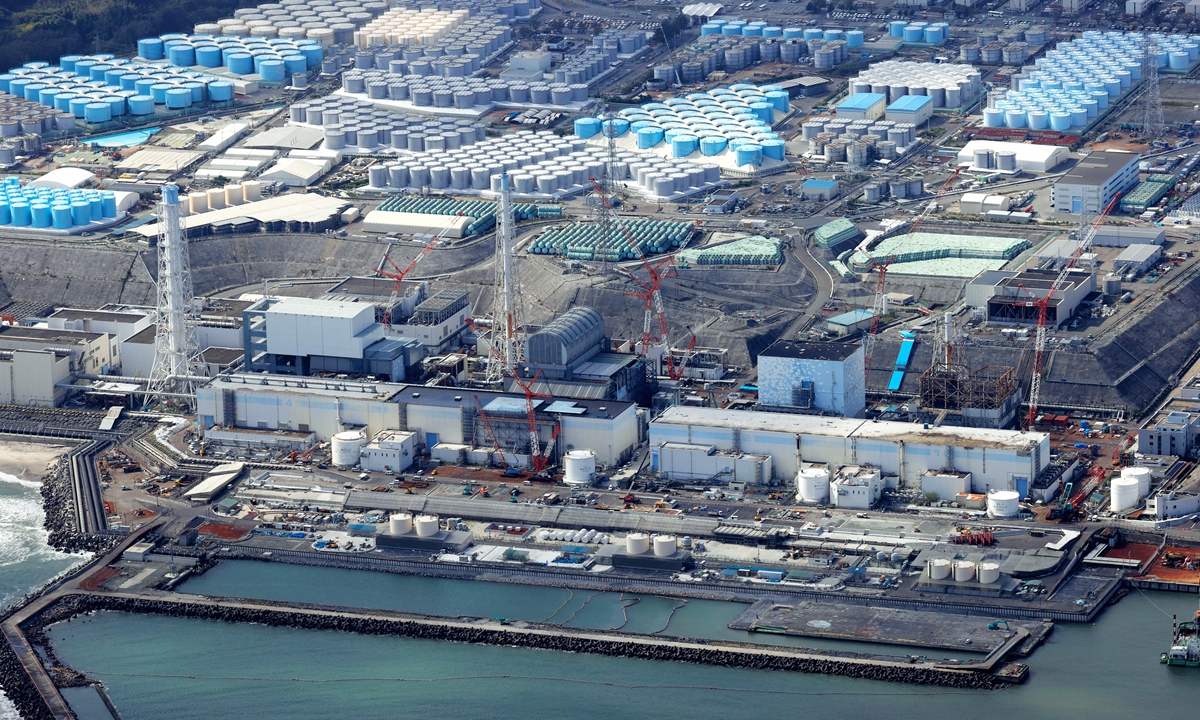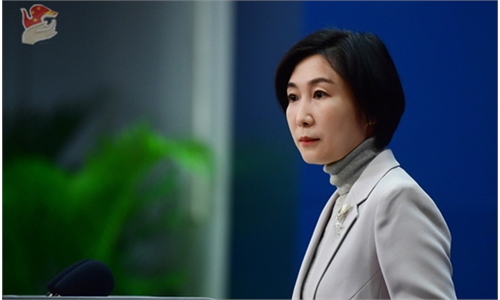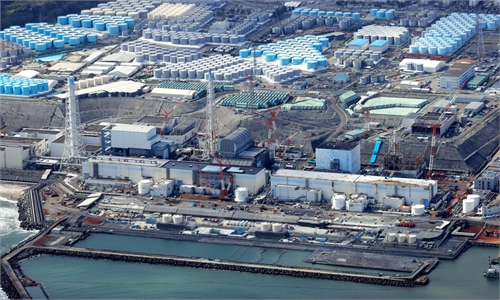
A file photo shows containers of nuclear-contaminated water at the Fukushima nuclear plant in Japan on October 16, 2020. Japan's nuclear regulator on July 22, 2022 approved the dumping of the water into the sea, despite international concerns and protests. Photo: VCG
Amid backlash from domestic and the international community, the Japanese government reportedly is to seek the endorsement of the Group of Seven (G7) nations for its controversial plan to discharge radioactive contaminated wastewater from the crippled nuclear power plant in Fukushima Prefecture into the Pacific Ocean. Analysts criticized countries that are giving a go-ahead signal to Japan's irresponsible dumping plan, noting they will share the shame of making irreversible damage to maritime environment and human health.
As this year's chair, Japan is seeking to include a phrase that says the G7 members "welcome" its "transparent" approach toward the disposal of the treated water in a document to be released after the April 15 to 16 gathering in Sapporo, Japanese media Kyodo News reported citing government sources.
In January, the Japanese government and the plant operator, Tokyo Electric Power Company Holdings, announced the plan to begin discharging the treated water around this spring or summer, with construction work underway to install an undersea tunnel and other necessary facilities.
Analysts said that Japan has beefed up efforts in soliciting support from the US and Western countries for its disposal of the Fukushima radioactive contaminated wastewater and in promoting its narrative of the "safety" of the wastewater amid growing oppositions from domestic public, neighboring countries and other stakeholders.
Against the backdrop of the Ukraine crisis and current tense Korean Peninsula situation, Japan is working to create the momentum for its dumping plan especially among Western countries as other G7 nations are also members of NATO and the military pact is seeking closer cooperation with Japan, Da Zhigang, director of the Institute of Northeast Asian Studies at the Heilongjiang Provincial Academy of Social Sciences, told the Global Times.
This is not the first time for Japan to try to include the Fukushima nuclear wastewater issue into the G7 declaration. In May 2016, after the Ise-Shima Summit in Japan, the G7 Leaders' Declaration wrote about "steady progress on decommissioning and treatment of contaminated water" as well as "Japan's efforts to proceed in an open and transparent manner in close communication with the international community."
The US also expressed support for its close ally in Asia. In April 2021, after the Japanese government mentioned the plan to release more than 1 million metric tons of treated radioactive water, the US Department of State said in a statement that Japan "appears to have adopted an approach in accordance with globally accepted nuclear safety standards."
However, fancy words from the US and the G7 cannot gloss over the increasing questions over the safety of the "treated" wastewater, the transparency of Japan's processing of the contaminated water and its consultations on the disposal with related neighboring countries, analysts said.
Pacific island nations also urged Japan to delay the release of the contaminated water over fears fisheries will be contaminated and that the health of people will be affected. For example, during a livestreamed public meeting in Suva, Fiji on January 18, the Pacific Island Forum Secretary General Henry Puna said, "Our region is steadfast that there be no discharge until all parties verify it is safe."
At the Security Council session on February 14 over Japan's discharge of nuclear-contaminated water, both representatives from China and Russia expressed concerns over the issue. Ambassador Zhang Jun, Permanent Representative of China to the UN, made China's position clear, stressing that "Japan's discharge of nuclear contaminated water into the sea will severely endanger the global marine environment, ecosystems, and the lives and health of people of all countries."
"Japan has been bent on forcibly approving the discharge program of the nuclear contaminated water and has been accelerating the preparations for the discharge. Such behavior is extremely irresponsible," said Zhang.
Lingering threats
The Japanese government sees the plan of dumping the contaminated water into the ocean as the most "economic" way to get rid of the burden from the destroyed Fukushima nuclear power plant. But people in Japan, neighboring countries and the world will pay the price given the irreversible damage to environment and human health, Zhou Yongsheng, deputy director of the Japanese Studies Center at China Foreign Affairs University, told the Global Times.
The Japanese government will be condemned and held accountable if it irresponsibly discharges contaminated nuclear wastewater into the ocean and countries that give green light to Tokyo's moves will also share the shame, said Zhou.
Concerns expressed by UN human rights experts, global nongovernmental organizations and activists from all over the world and their own countries may make G7 countries to consider more than only political leverage, analysts said.
As far back as 2021, independent experts appointed by the United Nations Human Rights Council have expressed deep regret on Japan's decision to release contaminated water into the ocean.
They noted that the water processing technology known as ALPS had failed to completely remove radioactive concentrations in most of the contaminated water stored in tanks at the Fukushima Daiichi plant. The radioactive hazards of tritium in the water, which cannot be removed, have been underestimated and can be detrimental to humans and pose threat to the environment for over 100 years.
Japanese fisheries and Japanese people will be the first to be affected and the whole world will also suffer as oceans are linked. If the US and other G7 nations are the real protectors of the environment and human rights as they like to trumpet, they should have opposed Japanese government's transboundary environmental harms, said Zhou.
As Japanese activists have staged protests against the government's discharge plan for years, analysts called on more countries to join them and the neighboring countries in urging the Japanese government to stop making irreparable damage to the world.



